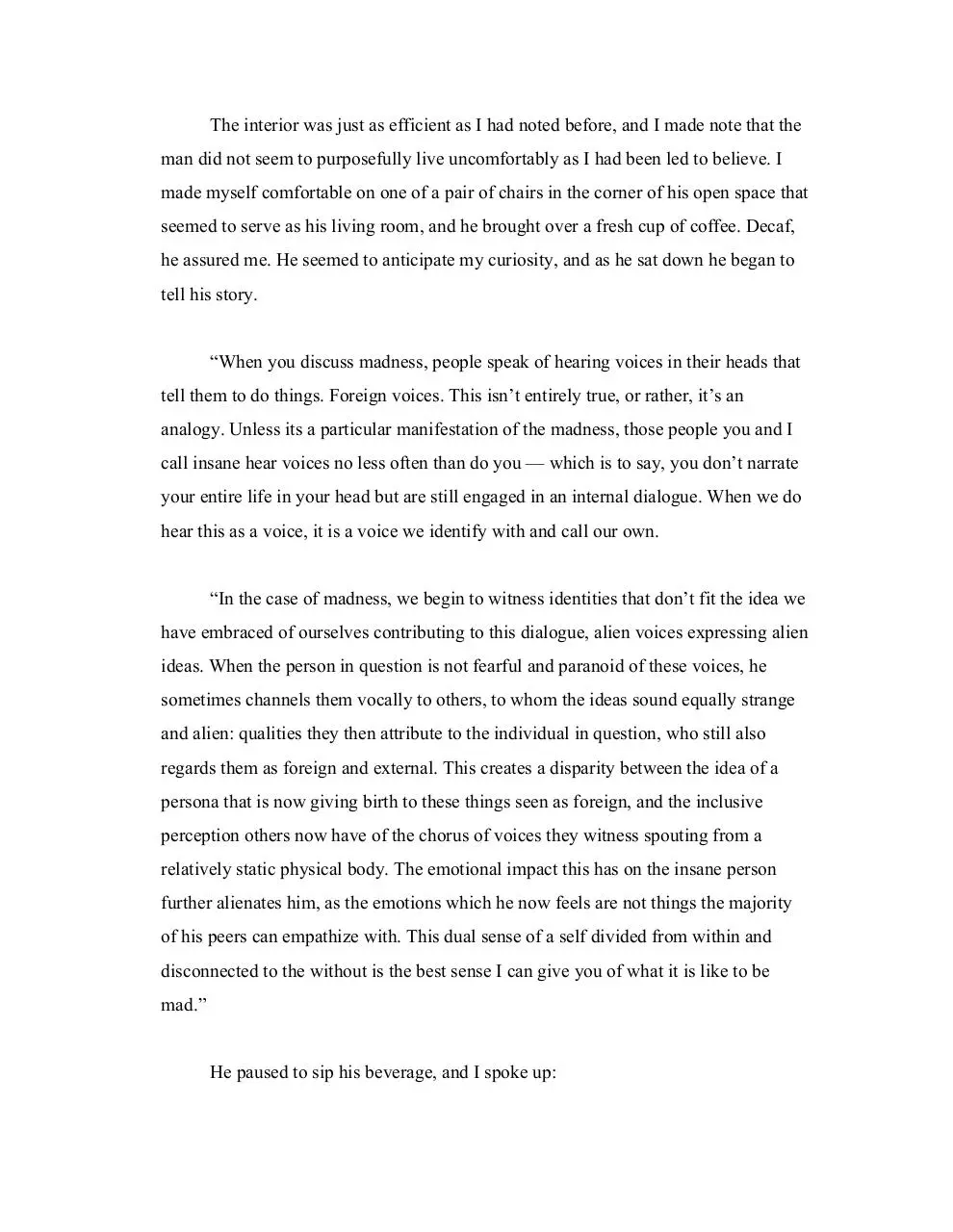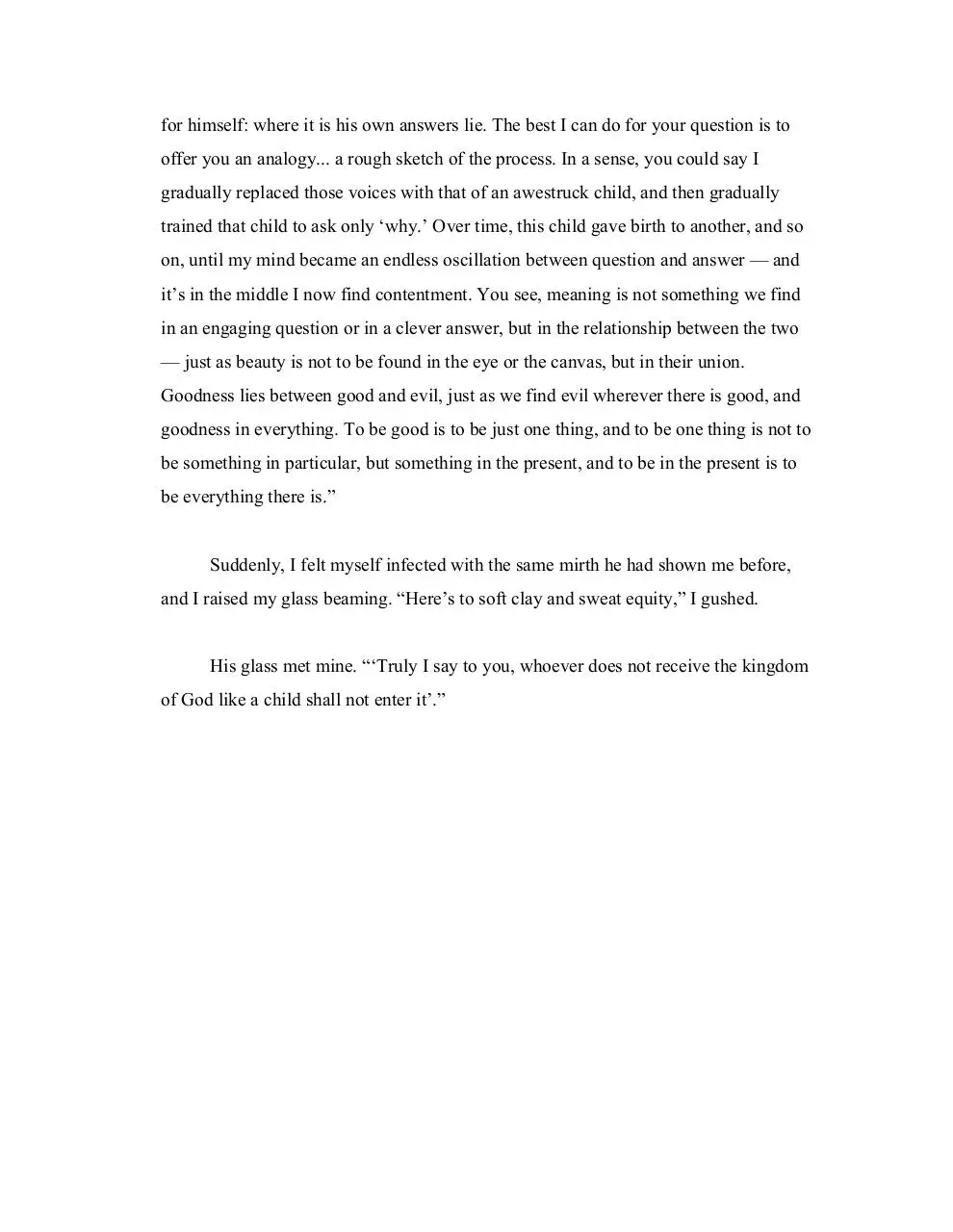ToRaiseaManItTakesaVillageofChildren (PDF)
File information
This PDF 1.4 document has been generated by , and has been sent on pdf-archive.com on 13/02/2015 at 07:56, from IP address 68.63.x.x.
The current document download page has been viewed 503 times.
File size: 124.05 KB (5 pages).
Privacy: public file





File preview
I returned home a short while ago to attend the funeral of a childhood friend.
While there and exchanging pleasantries, I was told a tale so peculiar I decided
immediately to determine its veracity myself. A man whom I had known as a boy that
had (last I had heard) succumbed early in life to some kind of madness was rumored to
be living as an ascetic recluse deep in the woods west of town. For some reason, I was
filled with curiosity as to his fate and state of mental clarity, and I decided to pay him
a visit before leaving town.
The road heading to his cottage degenerated slowly from asphalt to gravel and
then overly vegetative dirt in its thirty mile deviation from civilization, culminating
finally in a unkempt game trail, under the soft soil of which I could occasionally feel
what may have once been an inviting trail of stepping stones. There was no flickering
fire coming from the windows, no rocking chair, no clothesline. In fact, besides a
small herbal garden, the residence looked rather moder, although unmistakably rural. I
knocked.
The door opened almost immediately, but deliberately, which seemed somehow
more dramatic. No bearde oldd face met me, but instead one that was unmistakably
that of an old friend: intelligence and calm behind kind, familiar eyes. He embraced
me.
“What a pleasant surprise!” was his genuine greeting, laughing just as sincerely
as he once had with that laugh I remembered from the schoolyard so long ago; I
marveled that such a laugh had ever broken bread with insanity.
“Well I was in town, and heard that you were and I came to…”
“See if I was crazy, naturally. Please come in.”
The interior was just as efficient as I had noted before, and I made note that the
man did not seem to purposefully live uncomfortably as I had been led to believe. I
made myself comfortable on one of a pair of chairs in the corner of his open space that
seemed to serve as his living room, and he brought over a fresh cup of coffee. Decaf,
he assured me. He seemed to anticipate my curiosity, and as he sat down he began to
tell his story.
“When you discuss madness, people speak of hearing voices in their heads that
tell them to do things. Foreign voices. This isn’t entirely true, or rather, it’s an
analogy. Unless its a particular manifestation of the madness, those people you and I
call insane hear voices no less often than do you — which is to say, you don’t narrate
your entire life in your head but are still engaged in an internal dialogue. When we do
hear this as a voice, it is a voice we identify with and call our own.
“In the case of madness, we begin to witness identities that don’t fit the idea we
have embraced of ourselves contributing to this dialogue, alien voices expressing alien
ideas. When the person in question is not fearful and paranoid of these voices, he
sometimes channels them vocally to others, to whom the ideas sound equally strange
and alien: qualities they then attribute to the individual in question, who still also
regards them as foreign and external. This creates a disparity between the idea of a
persona that is now giving birth to these things seen as foreign, and the inclusive
perception others now have of the chorus of voices they witness spouting from a
relatively static physical body. The emotional impact this has on the insane person
further alienates him, as the emotions which he now feels are not things the majority
of his peers can empathize with. This dual sense of a self divided from within and
disconnected to the without is the best sense I can give you of what it is like to be
mad.”
He paused to sip his beverage, and I spoke up:
“But there are good medications for this type of thing these days, correct? Have
you tried them, or do you take them..if you don’t mind me asking?”
“Oh yes, silence can always be induced by force, because it is a form of
obedience, and we must all obey some master or another — whether or not we
exercise the freedom to choose whom it might be. There’s just something
disconcerting about living in a prefabricated home, having your permanent
environment be the product of someone else’s imagination. I thought about saying
‘prison,’ but decided against it. I will say this though, the difference between a home
and a prison, and I’m not necessarily talking about houses here, is a lot harder to find
than you might imagine. A prison is ineffective if it does not keep the world out as
well as it does its inhabitants
in
, but a home is only a
dwellin
g if it does not draw us
and what we want in as well as it does keep what and those we fear
out
. The only
difference between the two is the purpose of their architects: we build the one for
ourselves, but the other is built for us. To sit is one a source for pride, and the other,
shame. Although, there is a lot to be said for ignorance and its role in mitigating these
contrary perspectives of mine.”
I sat silently, so he continued on.
“I decided to build then, but to do that I needed to clear myself a space to work,
and that took time. But, I’m sentimental, and I kept some trinkets of the old place to
decorate with, my name for instance.”
He laughed.
“But in any case, I’ve found sweat equity to be a reliable investment, and I do
not believe I will die harboring the idea of regret, and so I will die at peace.”
“But what about your ‘voices?’” I interjected at this point, feeling a bit left
behind.
“Surely it’s not a matter of simply destroying them, willing them into oblivion?”
I was greeted with a smile.
“Of course not, there is no oblivion that one thing might meet and not the other,
but just as all things change form and state by the rearrangement of their constituents,
so it is with the contents of our consciousness. Mass is added and subtracted more or
less gradually, and we become larger and smaller, more or less suited to different
modes of existence. We exercise control of these contents inasmuch as we recognize
them to be impersonal and transmutable, our being a configuration of clay that
threatens to harden and become obsolete without constant use and care. So I took those
foreign bits within my awareness, those ‘voices,’ and trained myself to reshape and
repurpose them, learning along the way just how foreign that thing, that ego that had
called the voices foreign, was in itself a stranger to the rest of existence, an unnatural
projection filled with a hodgepodge of other people’s bad ideas that created this ball of
existential tension — the feeling that
being
made no sense and that there needed to be
some meaning in all of it to explain all of the senseless arbitrary pieces it was made
of.”
“But how did you repurpose them, not in regards to how you began to question
your ego, but how exactly did you figure out how to so drastically alter the structure of
your mind?” I asked, maybe a bit too doubtfully.
“Well first, let me tell you that I didn’t figure it out, and it wasn’t any one
person or school of thought out there; but yet, it’s something each man must figure out
for himself: where it is his own answers lie. The best I can do for your question is to
offer you an analogy... a rough sketch of the process. In a sense, you could say I
gradually replaced those voices with that of an awestruck child, and then gradually
trained that child to ask only ‘why.’ Over time, this child gave birth to another, and so
on, until my mind became an endless oscillation between question and answer — and
it’s in the middle I now find contentment. You see, meaning is not something we find
in an engaging question or in a clever answer, but in the relationship between the two
— just as beauty is not to be found in the eye or the canvas, but in their union.
Goodness lies between good and evil, just as we find evil wherever there is good, and
goodness in everything. To be good is to be just one thing, and to be one thing is not to
be something in particular, but something in the present, and to be in the present is to
be everything there is.”
Suddenly, I felt myself infected with the same mirth he had shown me before,
and I raised my glass beaming. “Here’s to soft clay and sweat equity,” I gushed.
His glass met mine. “‘Truly I say to you, whoever does not receive the kingdom
of God like a child shall not enter it’.”
Download ToRaiseaManItTakesaVillageofChildren
ToRaiseaManItTakesaVillageofChildren.pdf (PDF, 124.05 KB)
Download PDF
Share this file on social networks
Link to this page
Permanent link
Use the permanent link to the download page to share your document on Facebook, Twitter, LinkedIn, or directly with a contact by e-Mail, Messenger, Whatsapp, Line..
Short link
Use the short link to share your document on Twitter or by text message (SMS)
HTML Code
Copy the following HTML code to share your document on a Website or Blog
QR Code to this page

This file has been shared publicly by a user of PDF Archive.
Document ID: 0000209258.